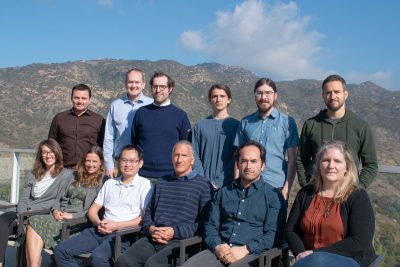
HRL Laboratories and UCLA Researcher Awarded Grant to Advance Quantum Computing
Collaboration aims to scale-up silicon-based quantum processors

Project Team Photo: Upper left to right – Matthew Borselli, Matt Reed, Andrew Oriani, Garrett Bimstefer, Cameron Jennings, Joseph Broz. Lower left to right – Alina Aleksandrova, Nina Popovic Schlomann, Minh Nguyen, Jason Petta, Edwin Acuna, Tiffany Davis.
MALIBU, Calif. January 10, 2024— Quantum computing is so new that researchers are still working on multiple technical approaches to realize practical systems. Simply put, we don’t yet have a standard model for how quantum computers will be constructed. Now, HRL Laboratories, LLC has won a grant from the Army Research Office and the Laboratory for Physical Sciences (LPS) to bring spin qubits, one of the most promising next generation qubits, to a working multi-qubit array in partnership with UCLA. The project – Universal Control of Scaled Spin Systems (UCS3) – will allow the team to explore new realms of physics and engineering that emerge in large-scale quantum devices.
The UCS3 grant is led by Jason Petta, professor of physics and astronomy at UCLA, and is a collaboration with HRL Laboratories in Malibu, where the chips will be fabricated and where Petta holds a position as research center director.
The team is attempting to embed cutting-edge quantum science technology onto silicon chips. “Achieving this would allow quantum computing to piggy-back off of existing semiconductor infrastructure and allow the technology to be produced at scale in a way that has never been done before,” said Petta.
Consider electronic circuits in the early 20th century – they were constructed with bulky vacuum tubes that were inefficient. Later, the invention of the transistor resulted in the rapid modernization of electronic devices practically making vacuum tubes obsolete. Much in the same way, many of today’s most advanced quantum processors are made with bulky components. Transitioning quantum technologies to a scalable, silicon-based platform like the transistor did to conventional electronics in the 1940’s could reap great benefits. “Semiconductors are poised to end the ‘vacuum tube’ era of quantum computing,” said Petta.
The team fabricates quantum circuits by isolating single electrons on a silicon chip. Then, they use the electron’s spin to encode, process, and store information. That’s the quantum part. The challenge is to fabricate tiny elements 10-50 nanometers in size (approximately 1000 times smaller than the diameter of a human hair) on the silicon chip. Signals applied to these elements control the motion of the individual electrons and implement the quantum circuit.
“The partnership between HRL and UCLA combines the reproducibility of an industrial wafer fabrication line with the agility of an academic research partner to enable unprecedented quantum measurements on state-of-the-art single electron spin qubits fabricated from Si/SiGe heterostructures,” said David Chow, chief scientific officer, HRL Laboratories.
The UCS3 grant builds on several initiatives to expand quantum science and engineering research in the greater Los Angeles area. In 2022, Boeing offered a significant gift to support UCLA faculty hiring initiatives. That same year, UCLA launched a master’s degree program in quantum science and technology (MQST). The MQST degree program, led by Dr. Richard Ross, is designed to increase the pipeline of highly trained researchers who can contribute to the quantum workforce. This year, the Laboratory for Physical Sciences launched the qubits for computing foundry (QCF) program. The program involves HRL and is designed to distribute quantum devices to academic researchers, including those at UCLA under UCS3, in order to accelerate research progress. Taken together, these programs will significantly advance both the technology of silicon-based quantum computing and the workforce supporting it.
“The combination of state-of the-art qubits from the QCF, a leading measurement activity in UCS3, and new workforce development programs at UCLA will both accelerate qubit science and help create the next generation of quantum talent,” said Charles Tahan, Assistant Director for Quantum Information Science at the White House Office of Science and Technology Policy and Director of the LPS Qubit Collaboratory.
Petta’s research is part of a concerted effort at UCLA’s division of physical sciences to address the growing impact quantum technology will have on society. “UCLA physical sciences has made a commitment to quantum research and Jason’s collaboration with HRL shows that we are on the right track,” said Miguel García-Garibay, dean of UCLA’s division of physical sciences. “As we continue to develop our strength in this area, I look forward to seeing their progress.”
UCS3 builds on a history of innovation in quantum computing. As a professor at Princeton University and UCLA, Jason Petta has been a national leader in the earliest prototypes of semiconductor qubits while simultaneously driving qubit quality through over a decade of seminal research. Over the same time period, HRL Laboratories has been developing critical recipes for silicon qubit fabrication and control as well as pioneering the type of silicon structure which will form a foundation for the chips to be developed in this grant.
Research was sponsored by the Army Research Office and was accomplished under Award Number: W911NF-24-1-0020. The views and conclusions contained in this document are those of the authors and should not be interpreted as representing the official policies, either expressed or implied, of the Army Research Office or the U.S. Government. The U.S. Government is authorized to reproduce and distribute reprints for Government purposes notwithstanding any copyright notation herein.
HRL Laboratories, LLC, California (hrl.com) pioneers the next frontiers of physical and information science. Delivering transformative technologies in automotive,aerospace and defense, HRL advances the critical missions of its customers. As a private company owned jointly by Boeing and GM, HRL is a source of innovations that advance the state of the art in profound and far-reaching ways.
Media Inquiries: media[at]hrl.com, (310) 317-5000